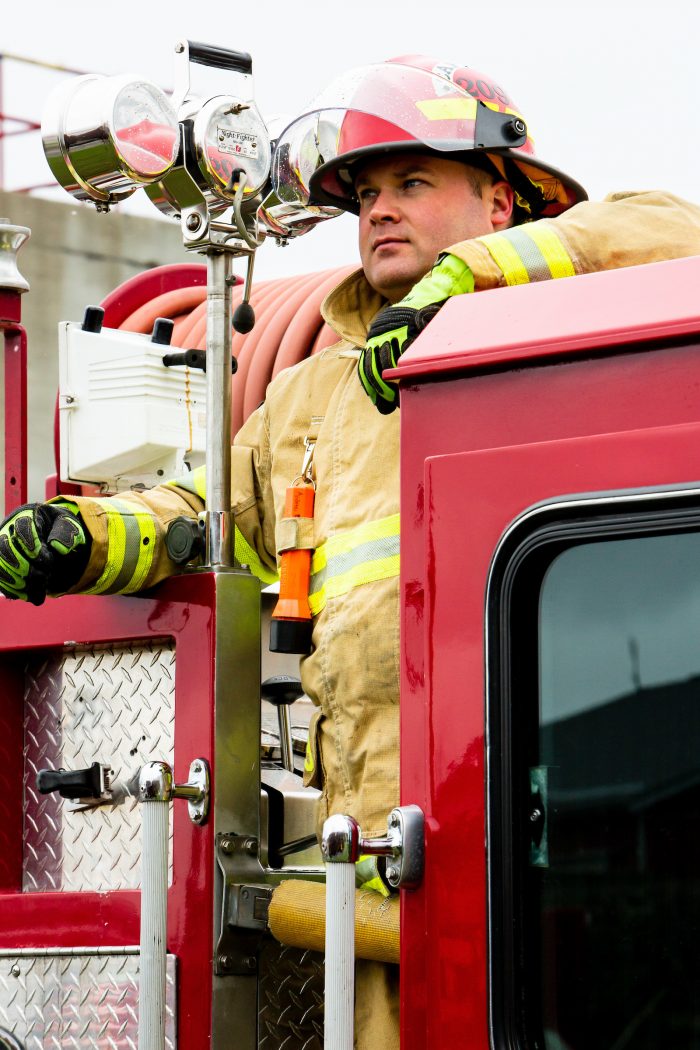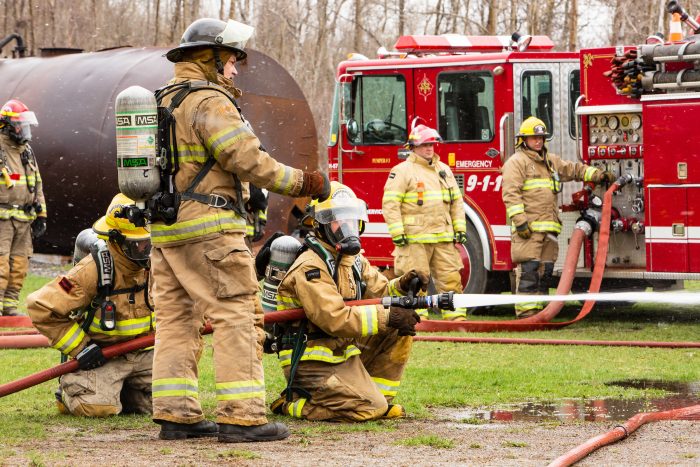Firefighters are on the front line of emergency response and are an integral part of any community, contributing to public safety, fire awareness and education. Learn the skills and knowledge to prepare you for success in the fast-paced and rewarding field of firefighting with this program, which conforms to the requirements for the National Fire Protection Association (NFPA) 1001.
Find your career
Prepare for a rewarding career working in such settings as municipal or regional firefighting, fire inspection, fire prevention and public safety, the Canadian military or the Ministry of Natural Resources.
Graduates will be qualified to work in a range of careers in the firefighting field, including as firefighters, medical attendants, fire rangers and fire alarm technicians.
Is it for you?
A career in the field of firefighting is both challenging and rewarding. You may be well suited to a career as a firefighter if you:
- Want a career where you can make a difference
- Enjoy working in a fast-paced environment
- Are able to work well both independently and as part of a team
- Thrive in difficult situations and are able to think on your feet
Experiential Learning
This hands-on program is designed to equip you with the knowledge and skills needed to work effectively as part of a fire service team and with other emergency responders to provide comprehensive service in emergency and non-emergency situations:
- Practise and test your skills in simulated and controlled live fire training situations.
- Learn about fire suppression, community education and fire prevention, firefighter emergency patient care, property conservation, environmental protection, confined space and environmental hazards, and rescue operations.
- Acquire the appropriate fire service terminology required to effectively communicate in a range of situations, and develop skills to communicate professionally with diverse communities and their members.
- Explore operating procedures, and acquire the skills to confidently use fire department communications equipment, personal protective clothing and protective equipment.
Upon successful completion of the program, graduates will be eligible to undertake the OFM provincial firefighters test and upon successful completion of this test can apply for standing under NFPA 1001 as Firefighter Level I and II from the Proboard.
Courses for this program are currently under review. Please check back to this page regularly for updates.
- First Year - Semester One
- PSFP1002 Emergency Medical Response (EMR)
-
Emergency Medical Response (EMR) provides the knowledge and skills that are necessary in a medical emergency to help sustain life, reduce pain, and minimize the consequence of injury or sudden illness. This course is designed for those providing professional level emergency patient care including firefighters and EMS personnel while working in a prehospital setting. Meets the Paramedic Association of Canada National Occupational Competency Profiles for the practitioner level of emergency medical responder (EMR).
- FITN1013 Fitness & Resiliency for Firefighters 1
-
This course will provide the concepts of health, wellness and physical readiness, using both theory and practical applications. The aim of the course is to provide students with the opportunity, resources and direction to achieve the level of fitness required to enter into the fire service and maintain a healthy lifestyle while serving on the force. Students will be required to successfully complete the York University Firefighter Fitness Assessment or equivalent by the end of semester one.
Co-requisite: PSFP 1003
- PSFP1003 Fundamentals of Firefighting 1
-
This theory/ lab course introduces students to a broad range of firefighting foundational concepts, including personal protective equipment, ropes and knots, ground ladders, fire hoses, water supply, fire streams, fire behavior and fire control. Application of these skills in the lab and simulation environment further solidify these core firefighting concepts.
Co-requisite: PSFP 1001
- PSFP1001 Incident Response Systems & Communications
-
Incident Response provides an overview of how firefighters respond to a fire, work on the fire ground and report through the chain of command. Principles of accountability to the firefighters and the firefighting team is stressed with an understanding of how the firefighter fits in the joint services emergency response model. The ability to communicate throughout that chain is managed through the communication and dispatch systems used in the fire service. The proper use of communications, procedures and the operation of communication equipment will be complemented by working interprofessionally with the dispatcher and the firefighter.
Co-requisite: PSFP 1003
- PSFP1000 Professional Communications
-
This course is designed to help students develop effective academic and professional writing skills. Students will learn how to write summaries, resumes, cover letters, and analytical reports. They will also learn how to research and present information in clear, concise, accurate, factual, and unbiased language, and to write assignments that conform to the minimum standards of English grammar, spelling and punctuation.
- First Year - Semester Two
- Second Year - Semester Three
- PSFP2002 Fire Control & Operations
-
Fire control and operations will afford students an opportunity to integrate knowledge and skills learned throughout the firefighting program and to apply them during an intensive practice of basic firefighting skills in a controlled training environment. This course will also take students through the coordination of fire attack, fire protection systems, as well as origin and cause analysis.
Prerequisite: PSFP 1004, PSFP 1007
- PSFP2003 Firefighter Comprehensive Review
-
The Pre-Service Firefighter program is designed to prepare students for the Ontario Fire Marshal and Emergency Management (OFMEM) evaluations. This course permits the student to consolidate the firefighter knowledge and skills and prepare for the OFMEM theory and practical evaluation skill tests.
Prerequisite: FITN 1013, PSFP 1000, PSFP 1001, PSFP 1002, PSFP 1003, FITN 1014, PSFP 1004, PSFP 1005, PSFP 1006, PSFP 1007
Co-requisite: FITN 2011, PSFP 2000, PSFP 2001, PSFP 2002
- FITN2011 Fitness & Resiliency for Firefighters 3
-
This course will explore the constructs of PTSD, work-life balance, resiliency and crisis management for the individual, their families and communities. The aim of the course is to expand on the concepts from Fitness & Resiliency for Firefighters 2 to ensure that the student is able to maintain their fitness testing capacity for entry to practice.
Prerequisite: FITN 1014
- PSFP2001 Hazardous Materials Awareness & Management
-
This course will provide the student with an awareness of how to recognize, respond to, and protect themselves from hazardous materials and weapons of mass destruction.
- PSFP2000 Specialized Rescue & Operations
-
This course takes the student through basic rescue skills that are used for various fire department rescue scenes. Students will learn skills to perform patient rescue, firefighter rescue, self-rescue and auto extrication. Students will also learn skills that can be used to support specialized rescue operations such as water rescue.
Prerequisite: PSFP 1005, PSFP 1007
*Courses subject to change.
Upon successful completion of the certificate, learners can build on their knowledge and skills through transfer into other EMS, health-related professions such as paramedicine.
How much will it cost?
Approximate costs (2022 – 23)
- Domestic Tuition: $11,100 year one (three semesters)
- Full-Time Ancillary Fees*: $2,175 in ancillary fees for year one (three semesters)
- Additional Program Costs:** $2,300 (fire kit, uniforms, equipment and books)
*Please visit the Tuition and Fees web page for a list of the many services, activities and items included within the ancillary fees, and the related policies.
***Please note that the additional program costs are subject to change.
Bursaries and financial assistance
Loyalist has a number of scholarships, bursaries and academic awards available to students. Our Financial Aid Office can help you explore your options, or assist you with a student loan.
Admission requirements
Required academic preparation
OSSD/OSSGD or equivalent with courses at the general, advanced, (C), (U) or (M) level with:
- Grade 12 English (C or U) AND
- Grade 11 Mathematics (C, M or U) level or equivalent
OR
Additional requirements
- Throughout the program, students will be required to wear a self-contained breathing apparatus (SCBA). To wear the SCBA properly, students must be able to achieve a proper seal with the face piece. This can only be accomplished if the student is clean shaven. Loyalist College follows the requirements in CSA Z94.4 Standard on the Selection, Use and Care of Respirators to ensure the health and safety of our students.
- Prior to the end of the first semester, and in order to proceed to semester two, students must pass the York University Fitness Evaluation or its equivalent. A re-test is at the student’s expense.
- Minimum 20/30 uncorrected vision in both eyes with no significant colour deficiency is a normal fire department requirement but will not prevent admission into this program. Students not meeting this requirement are required to sign a letter of understanding stating they’re aware of fire department requirements.
- Valid Standard First Aid and Cardiopulmonary Resuscitation (CPR)-C for Health Care Provider (HCP) certificates. Documentation must be submitted to the program coordinator upon admission into the program.
-
Prior learning assessment and recognition
Applicants with work experiences or other types of non-credentialed learning may be eligible for credits at Loyalist. Graded credits (as opposed to exemptions) are granted. Click here for more information about our assessment and credit challenge process.
International students
International students can apply for September 2021 intake. Click here for information about how to apply, international student fees and more.
Campus News
No articles to show.
In the News
 The Napanee Beaver
The Napanee Beaver
 Quinte News
Quinte News
 Belleville Intelligencer
Belleville Intelligencer










 The Napanee Beaver
The Napanee Beaver